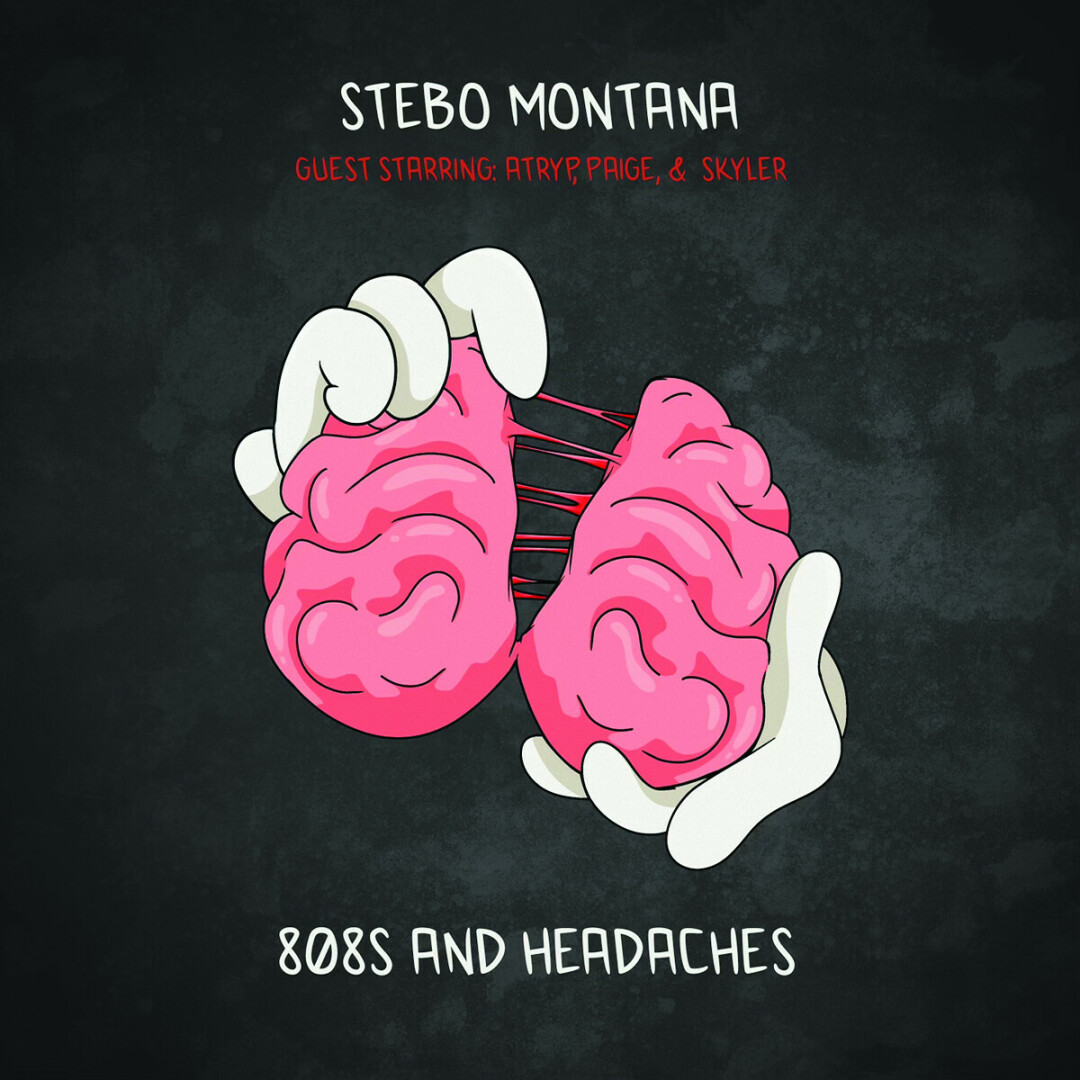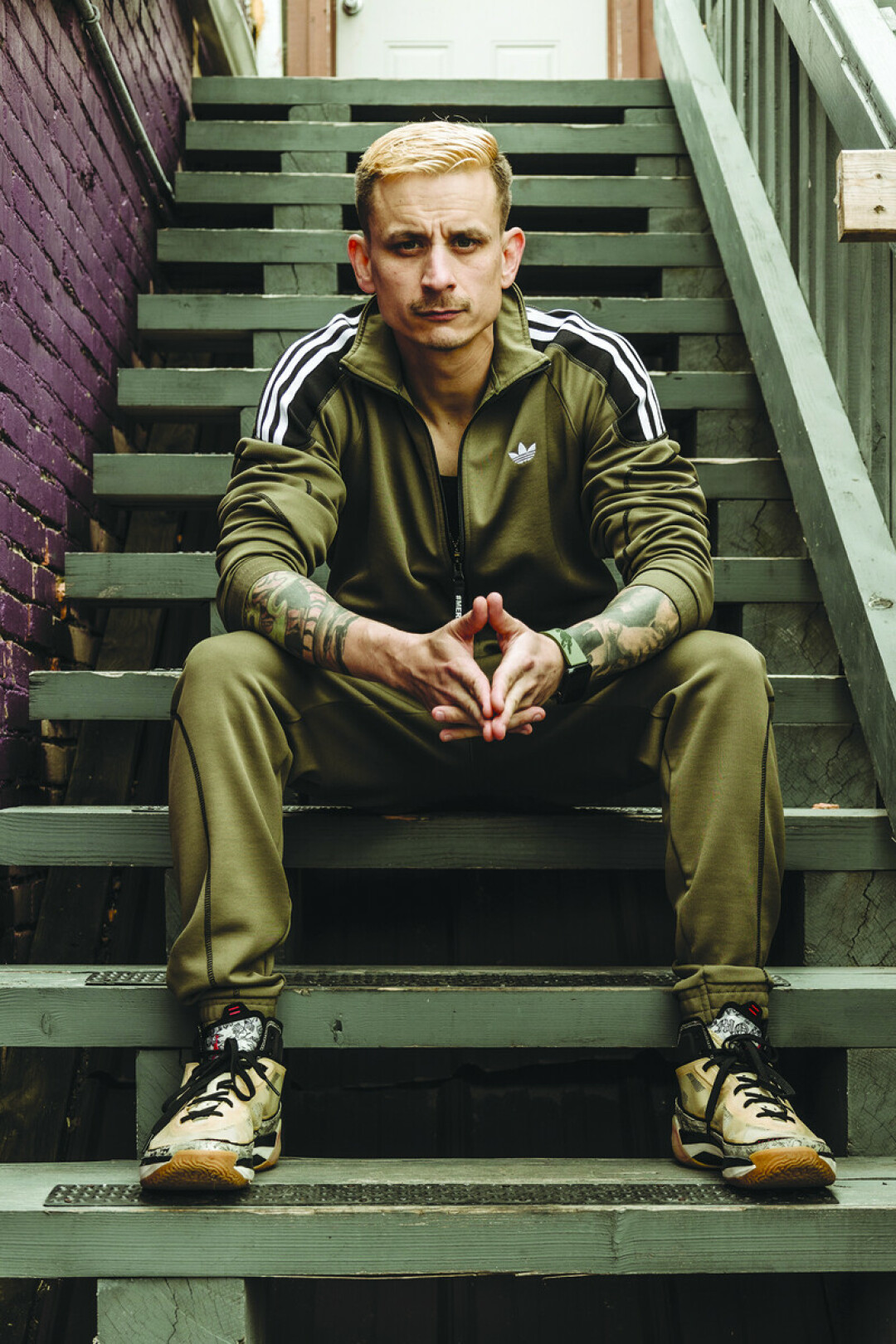Stebo Montana
Bozeman’s own Stebo Montana, aka Steve Olsen, is a U.S. Army veteran. He deployed to Iraq for Operation Iraqi Freedom in 2003. Like so many veterans who return home from war, he endured a brutal uphill climb from the depths of PTSD, addiction and prison to claim back his life. He is a husband, a father, a musician, and a mentor to other veterans.
Steve’s punk-hop album, 808s and Headaches, is out now, and available on all streaming platforms.
Kohlby Langel: How long have you been working on 808s and Headaches?
Steve Olsen: I started working on the album in 2020 with my best friend, Skyler Niedrist (The Rocking Chads). We’ve been best friends for over 30 years. Actually, longer than that now, 33 years. It’s hard to keep up.
KL: What motivated you to write it?
SO: After one year of sobriety, my VA therapist told me to pick up an instrument because that would help my mind come back from opioid abuse. From that point, I started making music with Skyler and we came up with a demo album.
KL: How did producer Jake Fleming (The Shed Studio) get involved?
SO: Skyler and I hit a wall with the demo as far as mixing, so we went to Jake, a former music teacher we had at Manhattan High. Skyler got busy with life obligations, so Jake and I started honing in on the demo songs. Jake has long been a mentor to me through yoga and music. At one point, I almost thought about scrapping the whole project and starting to write new songs but I came upon this Bruce Lee quote where he’s like, “I don’t fear the man that knows a thousand kicks, I fear the man that knows one kick and practices that kick a thousand times.” So, I was like, these songs are pretty good, let me take them and make them the best that I can and go the furthest I can.
It was serendipitous timing for working with Jake, because he was getting his Masters degree from Berklee in music production, mixing, etc. His game was leveling up at that time and he was getting new ideas. We were trying new things that I never would have tried on my own. I think that’s why you want to work with a producer, right? Like, if you’re not going to be comfortable doing innovative stuff, then just make your own stuff at home. There were definitely moments where he pushed me outside my comfort zone and I was like, “Oh man, I don’t know if I want to do that,” but he’s the expert, so…
When asked for his thoughts on working on 808s and Headaches, Fleming had this to offer: “At first I was teaching Steve music production techniques. Once we started getting into his music more deeply, I discovered he had the courage to use his physical, spiritual and aesthetic voice to keep important societal issues at the forefront. From that moment to the completion of the album was a journey in experimentation, rewriting, recording, re-recording, adding more artists, their voices and styles, crafting the mix to create a genre bending collection of songs that are honest, edgy, familiar and new.”
KL: What other artists/collaborators are on the album with you?
SO: I have the wonderfully talented Paige Rasmussen and the amazing Kali Armstrong on vocals. My Favorite rapper around, Atryp. The legendary Mike Gillan came into the studio and played drums on a track. And of course, Skyler Niedrist.
KL: What track stands out the most on this album and why?
SO: Man, they are all pretty different. I learned stuff on each one, but I think I’d have to say my favorite one right now is “Fake News.” My ultimate vision (on that track) would have been three different voices like the Beastie Boys, but with a harder metal sound. I think we got pretty close on that one. There are five tracks on the album.
KL: You have this punk/hip-hop fusion going on. Was that your intention?
SO: Ya man, I think there is this beautiful time in hip-hop that people don’t really know about, when punk rock and hip-hop were tied together into this DIY fresh form of exciting music. Take the Beastie Boys. Are they a punk rock band or are they hip-hop? I mean, they played instruments on the Paul’s Boutique album. Rick Rubin was one of the big catalysts in the Def Jam sound, and a lot of his influence is a heavy guitar sound. DMC from Run DMC loved the rock drums sound and he was like, “We gotta bring that into our music.” It was just a time when it was fused; they were close to each other. Rage Against the Machine was in that same vein as well.
KL: When I listen to your album, I hear a lot of 90’s influence and it definitely brings me back to a special place. What do you think?
SO: That’s what Skyler and I realized. What if Limp Bizkit talked about what matters in their songs like RATM did? Besides RATM’s lyrics, what really influenced me about RATM’s music are their driving bass riffs. That’s why I love playing the bass. I start making new riffs and then I can fill the rest of my sound around them.
KL: If you didn’t have all the life experiences that you do, such as being an army veteran, going to Iraq, going to prison, addictions, etc., do you think this album would still be happening? Alternatively, do you think maybe you would have had music in your life earlier?
SO: I think I might have tried earlier and then stopped, because it wouldn’t have had substance and real meaning behind it.
KL: Can you share a little more about what life was like for you when you were in the midst of finding that meaning? You mention earlier that you are sober — how did you arrive at the point you are at now?
SO: Several years after my military deployments I started to struggle with my health. I’d go into episodes where I’d vomit violently (PTSD related gastropareisis). At that time in my life I had already been to prison, and bodybuilding became my addiction; working out constantly, eating heavily to gain size and get as big as I could… then I would get sick and lose it all. It would just destroy me every time I’d get pain from the gastro issues, and my doctors prescribed opioids. I got trapped in a cycle, started to feel sorry for myself and got dependent on those pills. I never thought about what I could be doing in my life that would make things better or easier; I only thought, “I just need pills.” I ripped my esophagus and was life-flighted to a hospital in Billings and put on an IV drip of Dilaudid (a highly addictive opioid). It felt so good and from that point on I decided, “I’m just going to shoot up from here on out.” I started shooting pills first but the same people that sell pills sell heroin. This was at a time when the FDA started cracking down on opiate prescriptions, so pretty much every opioid addict in the whole country switched to heroin overnight. That was 2014-15. The FDA opioid crackdowns created a vacuum that heroin replaced. That time in my life was a big catalyst for me in writing this album. In a way, the pharmaceutical company got me hooked. We all know heroin is addictive, so bad on me, but bad on them, too, these companies that convince doctors to prescribe opioids to everybody.
KL: Would you say that the music you’re making now is therapy for you?
SO: Yes, and it’s a way to try to inspire other vets, other guys that have been to prison, drug addicts… to let them know you can still do cool stuff after you get out, get sober. Getting sober isn’t all there is; you can do more after that. Giving back to my community is important because my community has given so much to me. More than any of that though, I wanted to show my daughter that if you have a dream, you can do it in step-by-step goals.
Kohlby Langel is a U.S. Army veteran and Purple Heart recipient who owns Kohlby Langel Videography in Bozeman.